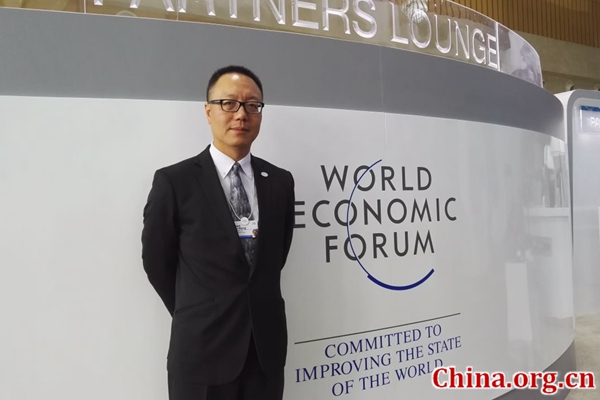Online game giant aims to ride the 4th Industrial Revolutionwww.wanmei.com 2016-07-14

Robert Xiao, CEO of Perfect World, China's leading online game developer and publisher [Photo / China.org.cn]
China should strive to contribute and even lead the tide of the Fourth Industrial Revolution, said Robert Xiao, helmsman behind Perfect World, China's leading online game developer and publisher.
Xiao, CEO of the online gaming juggernaut, made the remarks during an exclusive interview with China.org.cn on June 26 at the sideline of the Annual Meeting of the New Champions, a World Economic Forum (WEF) event known as the Summer Davos, in China's northern port city of Tianjin.
"Though China missed the past three industrial revolutions, it is now at the same starting point with the rest of the world in embracing the fourth one," said Xiao, who believes that his company, as a tech firm specializing in developing massively multiplayer online role-playing games (MMORPGs), is poised to keep pace with the times during the current intelligence and internet-driven development paradigm.
The WEF event, themed "The Fourth Industrial Revolution and Its Transformational Impact", convenes over 1,700 business leaders, policymakers and experts from 90 countries and explores the economic, societal, cultural and ecological impact of the latest shift in human history.
A global vision
The event, as one of the most prestigious gatherings of the world's thought-leaders, is particularly beneficial for Chinese companies who have a global vision to get some insight in their future strategies, said Xiao whose company is vying for a growing share of the world's profitable gaming industry.
According to him, Perfect World has undergone four stages in its globalization strategy. From the initial stage of marketing and selling its products through agent companies and then building locally based operations and offices, to investing in localized development and production, the Beijing-based video gaming giant now embraces a stage of global resource integration and consolidation that mainly benefits from its global network of distribution and production.
"Thanks to this global network, we can pool the wisdom of our employees worldwide," Xiao told China.org.cn. "One individual project might be, without any exaggeration, inspired by an excellent IP (Intellectual Property) from Japan, developed by our US designers, processed by a group of Chinese programmers and polished by our French visual effects artists."
According to statistics, the sales of its independently-developed online games ranked first in terms of overseas sales for many consecutive years against other domestic rivals and once took up as much as nearly 40% of China's total game exports.
Xiao confessed that the competition for talent and the games' entry threshold in Southeast Asia and the Middle East, with regard to cultural differences, are still major obstacles for its globalized ambitions.
Chinese culture 'imbedded' in games
In a world of competition for soft power, all forms of entertainment, including video games, are important vehicles of disseminating a country's unique culture. Xiao said that many of the company's games were developed based on Chinese ancient stories and myths while presented in traditional Chinese artistic styles.
"As one of the most profitable online games developed by the company, the Perfect World International (PWI) was actually inspired by the Classic of Mountains and Seas (Shan Hai Jing), a Chinese classic text and a compilation of mythic geography and myth," said Xiao, revealing that some users actually got interested in Chinese history and culture through playing the game.
Another example, as Xiao revealed, is a video game adapted from Chinese Kong Fu novels, which became so popular overseas that it actually boosted the original book's sales in South Korea by over 20% as soon as the franchised game hit the market.
"Games, in essence, are a form of digital art," he said. "By imbedding Chinese art into our games, we are actually introducing our cultures to overseas gamers in a way that can be better accepted by the younger generation."
